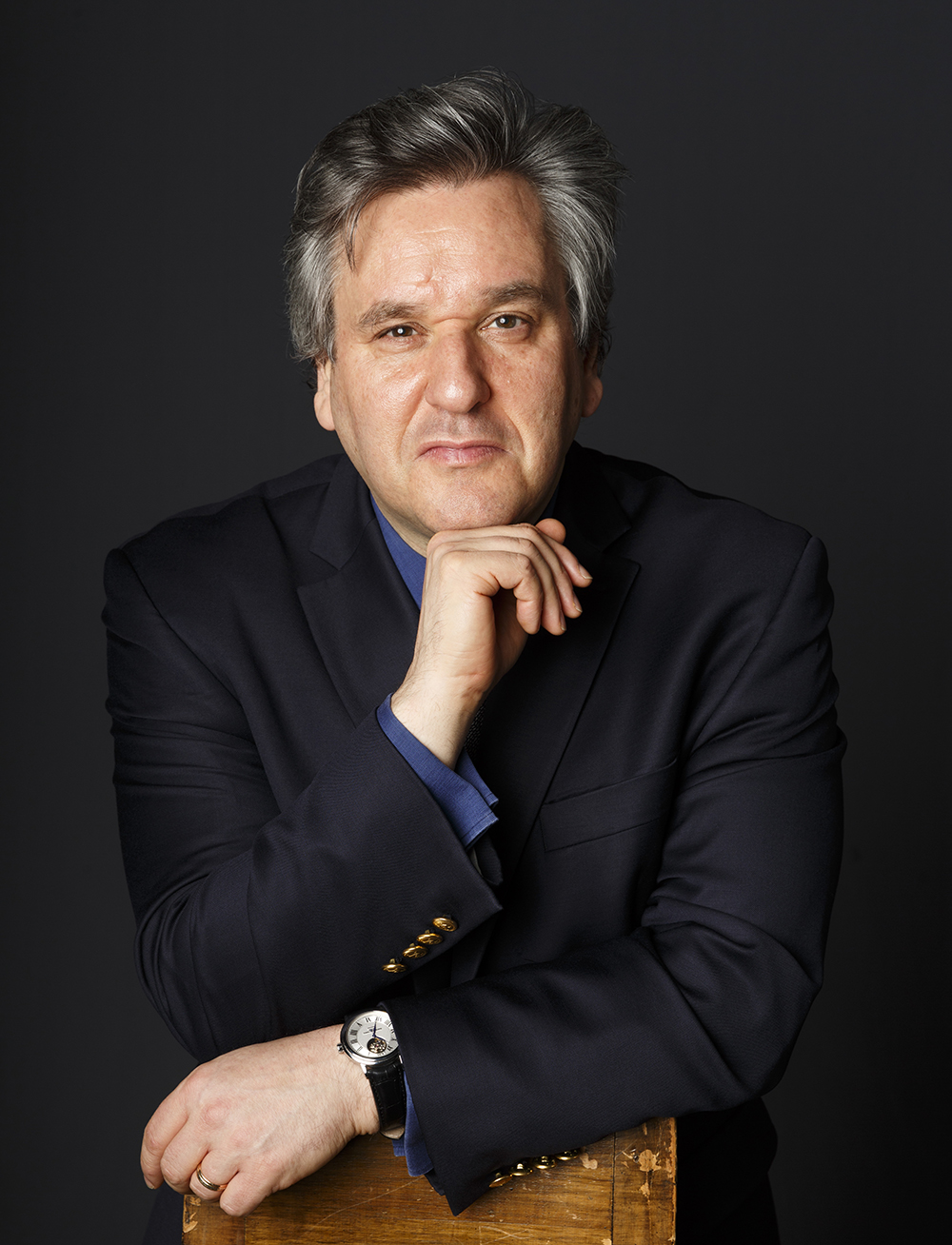
© Musacchio Ianniello
Antonio Pappano is in his 21st year as music director of London’s Royal Opera House—a record-breaking stint—while his tenure at Rome’s Orchestra dell’Accademia Nazionale di Santa Cecilia has lasted an equally impressive 18 years. A lesser man might sit back and relax, and yet next year he will trade it all in for the prestigious chief conductor role at the London Symphony Orchestra. Not bad for a kid from an immigrant family who once upon a time aspired to become a studio pianist.
Pappano—since 2012, Sir Antonio Pappano—was born in the U.K. to Italian parents who had emigrated from a tiny town in Campania. His father was a voice teacher, while his mother sometimes held down three jobs to make ends meet. Hard work, you might say, is baked into the DNA. “I remember cleaning offices with my mother—I was seven years old,” he recalls. “It was a full-on work existence, and nothing has changed. I’m the same now.”
We’re sitting in Pappano’s Covent Garden office early in the morning as he’s rehearsing Das Rheingold, the first instalment of the Royal Opera’s new Ring Cycle. A Mozart score sits on the piano, a palate cleanser ahead of a hard day of Wagner, he shares. The maestro is relaxed and expansive, reflecting on his first Ring as assistant to Daniel Barenboim in 1987.
“The Bayreuth experience was formative,” he explains. “You learn how to plan a huge project and how to guide it over a lengthy time span. Not only that, how to develop it each year, and to keep coaxing from the singers the performance the stage director and conductor built. You can imagine what rehearsing Rheingold means to me now, the memories it conjures up.”
Pappano’s has been an exceptionally hands-on career. He learned the nuts and bolts of singing accompanying his father’s students, a role he performed from the age of ten. When the family moved to Connecticut, he found himself playing rehearsals for the local opera company and making himself useful backstage. Moving to New York, he landed a répétiteur’s job at New York City Opera. Unusually for one of the world’s leading maestros, he never went to a conservatory.
At first, conducting wasn’t on his radar either. It was Danish soprano Inga Nielsen who gradually changed the way he thought. “I started coaching Inga, and she thought I was the greatest coach she’d ever met: ‘But you play the piano like an orchestra—you have to conduct!’ she said.”
Nielsen brought him to Oslo in 1987 for her first La bohème. “I went into the rehearsal room and was telling everybody how to sing, how to act, how to pronounce the words,” he explains, “and though the technical accomplishment was limited, I knew this was my world—that I was a theatre person.”
Ten years at Belgium’s La Monnaie taught Pappano the advantages of being music director of an opera house. “You develop a shorthand; and you give the house an imprimatur of what it stands for musically and dramaturgically,” he explains. “And of course, you get to choose your own repertoire. Had I continued on the guest conductor path, with a name like mine I’d probably be given Tosca, Traviata, L’elisir d’amore. I’m not knocking that repertoire, my God, but I wanted more. I wanted the whole thing.”
“It’s easy to shoot me down and say ‘he’s not a natural Wagnerian—he’s Italo-American-Anglo, this sort of stuff—but I did my time in Bayreuth. I’ve worked hard to be able to communicate these pieces in my own fashion.”
The Santa Cecilia job was a gift for a musician hungry to spread his wings beyond the opera house. “I understood what I needed to do to turn myself into a convincing symphonic conductor, to be able to look inside myself and come up with the goods in a different way,” he explains.
“Now, do I think of everything as narrative and storytelling? Yes, because that’s who I am, and it would be stupid to try to deny it. If you’re conducting Heldenleben, that’s good. If you’re in the middle of a Brahms symphony, it’s a little more difficult. But people will always smell the theatre in my musicmaking. That can be a criticism—fine—I accept it, guilty as charged.”
Pappano has a powerful work ethic, though he admits to being something of a hard taskmaster. “I’m quite relentless, especially in the rehearsal room,” he says. “I’m very detail driven, and this can make the work painstaking, but I try always to give reasons why I’m after certain things, so as to include others in my thought processes.”
As we speak, he’s gearing up for a seven-program season with the LSO, an orchestra he has been conducting since 1996. The top job, he thought, had slipped through his fingers when Simon Rattle accepted the post in 2015. But then Rattle quit, disenchanted with U.K. politics. “Did I covet that job? Yes. Did I think I’d ever get it? Not a chance,” he confesses. “Then all of a sudden, they asked—and you don’t say no to that job.”
If Pappano’s future looks bright, he’s aware that the future of classical music is more precarious. “It’s become a given that one fights to survive,” he concedes. “There’s no resting on laurels anymore.”
“You’re only as good as your last concert—that’s a credo I try to live by—and if somebody pays for a ticket, you’d better deliver something worth paying for. It’s as simple as that. It’s a perilous thing, but every concert has to be an event. Then you’ll keep your audience; then you’ll keep the music alive.” •
Clive Paget is features editor for the Musical America International Directory. A former editor of Australia’s Limelight, he writes and reviews for, among others, Musical America, The Guardian, Opera News, Gramophone, and BBC Music Magazine. Prior to his move to Australia, he developed new music theater projects for London’s National Theatre.